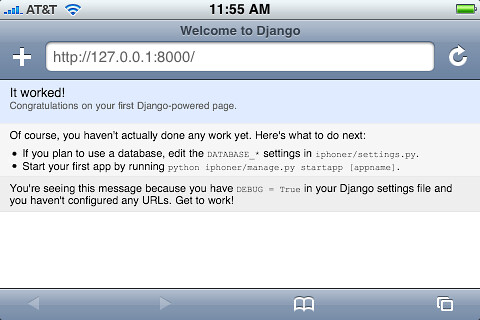My goal was to archive and display my internet lifestream. My first approach was writing a client for each API of the social networks that I'm in.
This turned out to be a complete waste of time and effort. All that I needed after all was a
FriendFeed account that would centralize all my feeds.
Archiving and displaying your entries with Django is quite simple.
First of all, you need to download the Python FriendFeed API client. Then start a new application in your project, lets call it lifestream:
./manage.py startapp lifestream
On the settings.py add the lifestream project to the INSTALLED_APPS and a variable to store your FriendFeed username:
FRIENDFEED_USERNAME = 'your_username'
In the models.py add a model named Entry:
from django.db import models
class Entry(models.Model):
id = models.CharField(max_length=255, primary_key=True)
service_id = models.CharField(max_length=50, null=True, blank=True)
service_name = models.CharField(max_length=50, null=True, blank=True)
service_icon = models.URLField(max_length=255, verify_exists=False, null=True, blank=True)
service_profile = models.URLField(max_length=255, verify_exists=False, null=True, blank=True)
title = models.CharField(max_length=255, null=True, blank=True)
link = models.URLField(max_length=255, verify_exists=False, null=True, blank=True)
updated = models.DateTimeField(null=True, blank=True)
published = models.DateTimeField(null=True, blank=True)
media_title = models.CharField(max_length=255, null=True, blank=True)
media_link = models.URLField(max_length=255, verify_exists=False, null=True, blank=True)
media_thumbnail = models.URLField(max_length=255, verify_exists=False, null=True, blank=True)
created = models.DateTimeField(auto_now_add=True)
def __unicode__(self):
return self.title
class Meta:
ordering = ['-published']
verbose_name = 'Entry'
verbose_name_plural = 'Entries'
class Admin:
list_display = ['title', 'service_name', 'published']
list_filter = ['service_name']
date_hierarchy = 'published'
Create an url.py on the lifestream folder:
from django.conf.urls.defaults import *
from lifestream.models import Entry
entry_list_dict = {
'queryset' : Entry.objects.all(),
'paginate_by' : 30,
}
urlpatterns = patterns('',
(r'^$', 'django.views.generic.list_detail.object_list', entry_list_dict),
)
As you can see, I've used a generic view. You can also use the date based generic views and pagination to build an archive like mine.
Add to your project root urls.py:
(r'^lifestream/', include('lifestream.urls'))
Create a template lifestream/entry_list.html:
{% for entry in object_list %}
<div class="source">
<a href="{{ entry.service_profile }}" title="{{ entry.service_name }}"><img src="{{ entry.service_icon }}" alt="{{ entry.service_name }}" alt="{{ entry.service_name }}" /></a>
</div>
<div class="details">
<ul>
<li><a href="{{ entry.link }}">{{ entry.title }}</a></li>
<li>{{ entry.published|timesince }} ago</li>
{% if entry.media_thumbnail %}<li><a href="{{ entry.media_link }}"><img src="{{ entry.media_thumbnail }}" alt="{{ entry.media_title }}" /></a></li>{% endif %}
</ul>
</div>
{% endfor %}
Finally, create a script to synchronize your feeds:
#!/usr/bin/env python
# -*- coding: utf-8 -*-
import sys
import os
ROOT_PATH = os.path.realpath(os.path.dirname(__file__))
PROJECT_PATH, PROJECT_DIR = os.path.split(ROOT_PATH)
sys.path.insert(0, ROOT_PATH)
sys.path.insert(1, PROJECT_PATH)
os.environ['DJANGO_SETTINGS_MODULE'] = '%s.settings' % PROJECT_DIR
from friendfeed import FriendFeed
from django.conf import settings
from lifestream.models import Entry
ff = FriendFeed()
feed = ff.fetch_user_feed(settings.FRIENDFEED_USERNAME)
for e in feed.get('entries'):
entry, created = Entry.objects.get_or_create(id=e.get('id'))
if created:
service = e.get('service')
entry.service_id = service.get('id')
entry.service_name = service.get('name')
entry.service_icon = service.get('iconUrl')
entry.service_profile = service.get('profileUrl')
entry.title = e.get('title')
entry.link = e.get('link')
entry.updated = e.get('updated')
entry.published = e.get('published')
media = e.get('media')
if media:
entry.media_title = media[0].get('title')
entry.media_link = media[0].get('player') or entry.link
thumbnails = media[0].get('thumbnails')
entry.media_thumbnail = thumbnails[0].get('url')
entry.save()
If you want, you can add a job in your crontab:
# synchronize every 15 mins
*/15 * * * * root /path/to/your/application/lifestream_cron.py
See my lifestream as the working example.
UPDATE: Friendfeed sends the time in UTC, if you want to use your timezone you have do some hacking:
Install pytz:
easy_install pytz
Import and assign your timezone to a variable:
import pytz
tz = pytz.timezone(settings.TIME_ZONE)
And replace entry.updated and entry.published with:
updated = e.get('updated')
updated = updated.replace(tzinfo=pytz.utc).astimezone(tz)
published = e.get('published')
published = published.replace(tzinfo=pytz.utc).astimezone(tz)
if settings.DATABASE_ENGINE == 'mysql': # http://code.djangoproject.com/ticket/5304
updated = updated.replace(tzinfo=None)
published = published.replace(tzinfo=None)
entry.updated = updated
entry.published = published
Thanks to Chris Kelly that send me an email reporting this.




